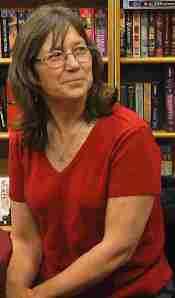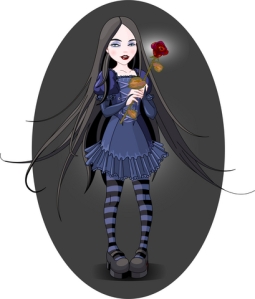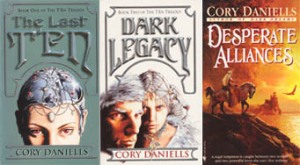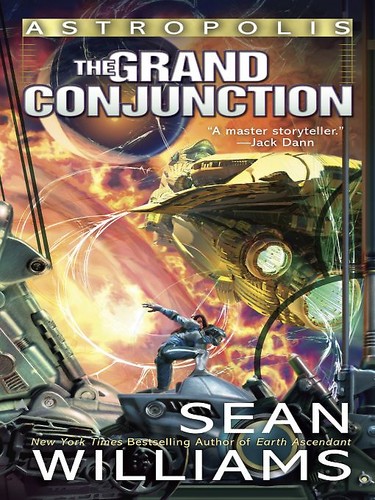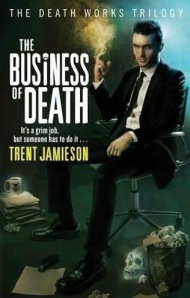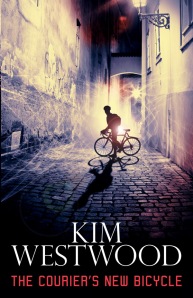Today I’m interviewing Dave Freer because, for one thing he is a wonderful writer, and also I thought I’d ask him the same questions I’ve asked the female writers about fantasy writing and gender, to get his perspective as a male fantasy writer.
Look out for the give-away at the end of the interview.

Q: You quote Lewis Carroll, the Hunting of the Snark, on your blog. This is entirely suitable as you are something of a Beamish Boy. Was the work of Lewis Carroll your first introduction to satire, whimsy and the fantastical?
Good grief, no. I was the most obnoxious little boy (I haven’t changed much) who started reading before school, and didn’t like fiction. My only tolerance for it was Kipling’s Just So Stories, which, as I was the third child, my dad had read so often he could recite. Those, to a brat who ‘knew’ the real answers, were delightful and whimsical. My first brush with sf/fantasy was satire was L. Sprague de Camp’s “Lest Darkness Fall” when I was nine. I remember it well, because I tried to ‘make’ all the inventions our inadvertent time traveller did. It did not end well. Like my attempts at parachuting with a beach umbrella off a 3 story building, it stands as proof that evolution-in-action fails quite spectacularly at eliminating idiots from the gene-pool. Perhaps we’re selecting for blind luck. The curious thing about that book was that at that age, I didn’t realise it was satire. It was just adventure, the triumph of ingenuity over brute force. I still have that very battered 1949 copy. It’s curious, in the gender debates that dominance of male sf/fantasy authors (particularly from my 1970’s childhood and before) that I came to sf via my mother, who started reading it from pulps left behind American servicemen working on the Naval guns on Robben Island, where she was a gunner. If there was a major gender stereotype of the time that shaped my perception, it was that only girls had ‘weird’ names. Boys were Matthew, Mark, Luke and John etc. Girls had started getting Marzipan, Autumn and Galadriel, but patriarchal society had boys still being spared Moon-unit and Wobbegong. So Rudyard… was female. Sprague… was female. Andre (Norton) was male. I got Zenna Henderson and Ursula LeGuin right.
 Q: You currently live in an island off the coast of Tasmania, but you are originally from South Africa. Do you think growing up in South Africa gave you a particular mind-set that has influenced the way you write?
Q: You currently live in an island off the coast of Tasmania, but you are originally from South Africa. Do you think growing up in South Africa gave you a particular mind-set that has influenced the way you write?
Put it this way there is no reason why growing up in say Seapoint or Rondebosch (wealthy formerly all-white suburbs) in South Africa (as a ‘white’ woman, anyway – men went to the army as conscripts) should be materially different to growing up in a wealthy suburb of Brisbane or Boston, except you probably had more chance of someone cleaning your home without having to be quite as wealthy. Having been ‘a South African’ is no guarantee of a better understanding of the poisonous effects of privilege and division than being say a white-bread American. Being born into my family made South Africa formative, though. So did conscription.
My mother was a De la Rey, one of the Lion of the West’s nieces, part of the hard core of Boer ‘Bittereinde’ (bitter end) Guerrilla fighters. She married the grandson of a British Army Boer War Surgeon General, in a time when the wounds of that war were still very raw (it took years before either family came around to it. Some of them never did.) My father–given his rather bizarre childhood, spoke and thought in Sotho more naturally than English—and was I think more at home with black South Africans than white ones. His work and I suppose my parents political and religious beliefs saw us mixing with people most white South Africans didn’t know much about. So I grew up tossed between cultures and learning people were human and rather alike even if they were lifelong traditional foes. Yes, it is one of the reasons I take mickey out of tradition a lot, although I believe in its tested strengths.
I was seventeen, very idealistic, and very wild, when I was conscripted. I was sent to the Medical Corps. I wasn’t eighteen before I saw my first man die. I grew up very fast and learned to be responsible, and saw things that haunt and shape me to this day. What shapes you, shapes your writing.
 Q: You’ve been in Australia a couple of years now. Just recently your son got married here (congratulations!). In a post on ROR you said: ‘it becomes very important to me know not just what ‘a squatter’ or ‘a bogan’ is but what implications there are in calling a character one. Knowing the baggage carried by a word and using that baggage can subtly make you a much more powerful and effective writer.’ Do you feel that you have a handle on the Ozzie mind-set now? Or do you still feel like a Stranger in a Strange Land?
Q: You’ve been in Australia a couple of years now. Just recently your son got married here (congratulations!). In a post on ROR you said: ‘it becomes very important to me know not just what ‘a squatter’ or ‘a bogan’ is but what implications there are in calling a character one. Knowing the baggage carried by a word and using that baggage can subtly make you a much more powerful and effective writer.’ Do you feel that you have a handle on the Ozzie mind-set now? Or do you still feel like a Stranger in a Strange Land?
Oh my word. It’s complex. You don’t learn a culture in a week or even two years. I’m very much in love with Australia, especially our Island, and, oddly especially the nearest it has to an indigenous people (the island had its pre-European settlement population die off in the last ice age. The sealers who settled on Island took (or traded) wives from the Tasmanian North East Aboriginal population. Like the Bounty mutineers, the Straitsmen had a culture and traditions of their own. It must have been a tough, stark life, and yet it produced a very close-knit solid people. There’s a strong affinity (particularly with the older people) to the land and sea and to living off it, with which I identify and find I can fit into. But know it and understand properly? No. Love it, want to learn about it, try to fit into it, yes.
 Q: In 2008 your book, Slow Train to Arcturus, won the Best SF &F novel in the Preditors & Editors Poll. I heard you read from this book at Worldcon in 2010. It struck me as a traditional premise told in an irreverent way. Were you surprised when the book won this award?
Q: In 2008 your book, Slow Train to Arcturus, won the Best SF &F novel in the Preditors & Editors Poll. I heard you read from this book at Worldcon in 2010. It struck me as a traditional premise told in an irreverent way. Were you surprised when the book won this award?
(Chuckle) According to my agent that book either had to win every award or be buried in soft peat by the industry. They chose the latter, but the book has a cult following so it got nominated in a reader-voted poll. To be honest I am at best ambivalent about most awards. They’re too much of a ‘cool kids club’ where if you’re ‘in’, you will at least be nominated. Some of those are very books of course, BUT If you’re ‘out’, it doesn’t matter how popular or good you are, it’s not going to happen until the book/s are so wildly successful that the ‘Cool kids gang’ are starting to look bloody stupid. Look no further than Sir Terry Pratchett for an example, where his DARK SIDE OF THE SUN should have won every award (and his CARPET PEOPLE – originally written IIRC when he was 17, every juvenile award)… and it took another 20 years and about a 100 million sales for Cool Kids to admit he was alive. I’m too much of a loose cannon, too socially maladroit, and far too politically incorrect for most awards.
Yes, Slow Train took an old trope – a slower than light generation ship taking colonists to the stars (which has been out of fashion for many years) and another old trope ‘humans meet aliens’ and turned both on their heads and made them spin and whistle waltzing Matilda out of every orifice. It also was one of the very rarest combinations in our genre – Hard SF and social satire.
Look, the reason that generation ships fell out of fashion (besides that hard sf is hard to write, and our genre is fashion-driven) is three-fold.
1) They really are slow. Interstellar war and trade – the life-stuff of our genre are hard across hundreds of years. And ‘colonisation’ is a nasty un-PC word (despite the fact that every human on earth is a colonist or descended from one. As Douglas Adams said, we’re not proud of our ancestors, and never invite them around to dinner.) .
2) When you get there (after hundreds of years), the place sucks. It’s either not habitable or worse, the locals don’t really want colonists. Or from a modern ecologist’s point of view, you’ll destroy a unique alien ecosystem.
3) We’ve never kept a closed ecosystem going for any worthwhile period of time. Generations is so far off plausible as to be silly.
 So I set about finding solutions to all three… and limiting our scenario to present or already theoretically possible and plausible science. And then, just because I have a theory of ordinariness (or orneryness, at times) I set about making a set of novel hard science ideas just parts of the background, that neither the characters (because they live with them and it’s an everyday situation) nor the reader are overwhelmed by flashing-light bling ‘science’. And yes, I am a manipulative son-of-bitch with an ulterior motive. Bling and flashing lights we accept as, well, fun-but-a-fantasy. Ordinary – Which both Heinlein and Asimov did well—becomes, quite rapidly ‘normal and expected’. And then the world moves to catch up. I don’t think social engineering via PC-speak works very well. I think it probably loses more readers than it changes minds. But if you’re subtle and clever about it (whether I am either is another matter, but I understand the need) you can shift perspectives. Of course it takes more effort and ability than PC-rote, but who said idealism should be easy? And yes, I believe we need interstellar travel, and that we should colonise space. I’ll explain why, as an ecologist, I believe this a little further on.
So I set about finding solutions to all three… and limiting our scenario to present or already theoretically possible and plausible science. And then, just because I have a theory of ordinariness (or orneryness, at times) I set about making a set of novel hard science ideas just parts of the background, that neither the characters (because they live with them and it’s an everyday situation) nor the reader are overwhelmed by flashing-light bling ‘science’. And yes, I am a manipulative son-of-bitch with an ulterior motive. Bling and flashing lights we accept as, well, fun-but-a-fantasy. Ordinary – Which both Heinlein and Asimov did well—becomes, quite rapidly ‘normal and expected’. And then the world moves to catch up. I don’t think social engineering via PC-speak works very well. I think it probably loses more readers than it changes minds. But if you’re subtle and clever about it (whether I am either is another matter, but I understand the need) you can shift perspectives. Of course it takes more effort and ability than PC-rote, but who said idealism should be easy? And yes, I believe we need interstellar travel, and that we should colonise space. I’ll explain why, as an ecologist, I believe this a little further on.
The solutions to problem 1) and 2) are relatively simple when you think about it (but like Columbus sailing West, no one seemed to). More than 2/3 of travel times at speeds we can presently attain… are used in acceleration or deceleration. What’s worse, is that those two phases take a vast amount of energy. Once the ship accelerates to its cruising speed (a process which would take about 20 years) that momentum must be conserved. Let’s put it this way – at 1/3 of light-speed cruise speed (theoretically possible now) accelerating and decelerating at ever star, a ship could perhaps cover 30 light years in 320 years. If it never decelerated, but dropped modules at each passing star, which did slow down, then a 100 light years becomes plausible. There are a lot of stars within 100 light years of Earth. Think of the ship as a train, dropping off the last carriage to slow down at each passing star. And that of course is the second feature: the humans no longer colonise planets. They don’t even care if there are planets. They colonise space. There is a habitable zone – and all the materials you would need – around nearly every star. It’s an idea that has been suggested for our solar system, just not for interstellar colonisation. To the best of my knowledge neither solution has been suggested anywhere else in sf. It does mean, that as an ecologist I can heartily support space colonisation. It will increase the variation of life in an area that supports none. The third issue of course is that bio-viability. Dyson spheres – the space habitat I suggest, are old hat. They’re big hollow bubbles with spin to provide pseudo-gravity on the inner wall by centripetal force. Which makes sense to an engineer, or a physicist… but not to biologist or a chemist. A biologist will tell you that the viability of a habitat is determined by size… multiplied by complexity—or in other words, by surface area. A chemist will tell you that almost all reactions are affected by… surface area. Your lungs only work, because, although they fit in your chest, their surface area is about that of a tennis court. So the insides of our space habitats are very complex spiral layers, making the surface area vast. Big and complex is far more stable, and these have another advantage. Like islands (but in space) they are largely isolated, but can draw from a resource pool, and act as reservoirs for each other. It’s good science, and it’s different, and, oddly, could work.
So then I introduced some more elements to it. Who colonises? Yes, it’s usually your refugees, your outcasts, your ne’er-do-wells, your convicts, your poor, your adventurers, your odd sects. The scaff and the raff? Maybe. Or are they something human society needs? Each of the habitats has a different set of migrants in it, off on a one-way, isolated multi-generational trip, which, especially viewed through alien eyes, is an interesting environment for social satire. Into this I added the reverse of Rendesvoux with Rama. I had an alien species, like but unlike us, meet the ship 300 years out from Earth. The aliens –who are principal point of view characters–provide an unusual outsider’s view of humans, and the weirdness that is our heterosexual species and the mores derived from this. They are de facto unisexual, starting as smaller mobile, risk-taking males, and, when they reach a certain size becoming near sessile, very conservative and territorial females (an arrangement that makes good biological sense, but is wholly unlike ours). Basically the hero is a bisexual male who comes from a matriarchal society.
And then, to finish putting my money where my big mouth is, I went along with one of my objections to the PC tokenism in science fiction. I took as his co-hero and companion, and later friend, the character who is NEVER allowed to be hero. Howard is one of the Bretheren – a fundamentalist Christian sect somewhere between the Quakers and the Amish, who practice traditional agriculture and, yes, are ‘white’.
So, yes, just a slight twist on the usual.
 Q: You indulge in what others might call Danger Sports, like rock climbing and scuba diving. You once told me that we writers have very little control over our books. We can write a wonderful book and then we send it off. Even if a publisher publishes it, we have no control over the cover, distribution or how long the book stays on the shop shelves and that taking part in dangerous sports was your way of achieving something you did have control over. With the changes happening in publishing (See Dave’s post on the Mad Genius Club blog), do you feel now that you have more options? And would you go down the self publishing route?
Q: You indulge in what others might call Danger Sports, like rock climbing and scuba diving. You once told me that we writers have very little control over our books. We can write a wonderful book and then we send it off. Even if a publisher publishes it, we have no control over the cover, distribution or how long the book stays on the shop shelves and that taking part in dangerous sports was your way of achieving something you did have control over. With the changes happening in publishing (See Dave’s post on the Mad Genius Club blog), do you feel now that you have more options? And would you go down the self publishing route?
Yes, and am doing so. As all of us who have been through the proposal route of selling books know, it’s a very damaging process—you build hard and then have drop a book you are now deeply involved in. And then pick it up again, often midway through an unrelated book. You also shape proposals around your agent and the target – which is a publishing house, not the important target, the reader. It’s not good for writers, and it’s not good for readers. It’s convenient for publishers. I keep saying to O’Mike (my agent, Mike Kabongo) that I’ve written my last proposal. And he talks another out of me. But I am determined to stop. A few publishers have various rights of first refusal, but I am rapidly approaching take it now or I will continue writing it.
 Q: You’ve collaborated with Eric Flint and Mercedes Lackey. Writing is a very individual experiences and you are a very individual individual. How did the collaborations work specifically?
Q: You’ve collaborated with Eric Flint and Mercedes Lackey. Writing is a very individual experiences and you are a very individual individual. How did the collaborations work specifically?
I write a first draft – sometimes only sketching scenes I want Eric or Misty to write. Eric does a structural edit, positing add-in chapters and scenes (there are few cuts) We divide the new scenes up, do a round robin edit, and submit. Collaborations take a degree of tolerance and egalitarianism from all parties. If that exists, they can work. If one person is inflexible, they don’t.
Q: I discovered the Witches of Karres books by James H Schmitz over thirty years ago and loved them. Now you’ve continued the series with Sorceress of Karres. Was it daunting knowing that you were writing in a much loved world using much loved characters?
 I absolutely hated the idea. I knew I wasn’t good enough or able to write like Schmitz. I got talked into it by Eric.
I absolutely hated the idea. I knew I wasn’t good enough or able to write like Schmitz. I got talked into it by Eric.
Q: I was prompted to start this series of interviews because there seems to be a perception in the US and the UK that fantasy is a bit of a boy’s club. Do you think there’s a difference in the way males and females write fantasy?
Sigh. As individuals there are female writers whose natural voice is rather like Robert A. Heinlein. There are male writers whose work shows derivation from Ursula Le Guin. I think you really, really, really need to judge a writer’s without the spectacles of a pre-conceived bias. My childhood assumption that Sprague was female and Andre was male, didn’t stop me loving both, and suggests that at base level readers don’t actually care, if the story is good for them. There may be gender differences in what is typically good for an average reader, but once again we wander onto generalizations to which there are many exceptions. It’s important to emphasize that. Prejudgment is for fools.
What I do think (sadly) that we see is peer group conformity pressure, both in male and female authors. It’s peer pressure, remember, that allows female genital mutilation to continue, often at the hands of older women. And it’s not confined to some uneducated Somalis. It exists still everywhere, and needs to be fought at all levels of society. I admit to feeling strongly about this, because of my mum. Look, there was never any woman less in need of ‘liberating’ – she was terrifyingly capable, and never let gender (or size–she was tiny) stop her doing anything she wanted to try–from driving 10 ton trucks (pre-synchromesh and pre-power steering) to carpentry. But she did. Once. She went off to university, the first woman of the family to ever do so, supposedly to train at a profession respectable for women: teaching junior school. As her mother (widowed) had no idea what courses she had to do, mum managed to take subjects that were ‘inappropriate’–Chemistry and Geology–in her first year, as the only female student. Unfortunately her second year required a narrowing of subjects. She broached the idea to her mother of… not teaching. Her mother simply said “no”. The head of the Geology Department actually came to call, to beg my grandmother to let his best student continue. She would have been the first female geologist in South Africa, which would have suited her as a profession down to the ground, and below it. And my grandmother, silly old bat, (I’ve never forgiven her for this) said ‘no, it was not a suitable profession for a woman.’
So: No. There is a difference in how individuals write. We do not write to group orders. Or at least we don’t have to.
 Q: Following on from that, does the gender of the writer change your expectations when you pick up their book?
Q: Following on from that, does the gender of the writer change your expectations when you pick up their book?
Good grief no. I’ve wised up enough to know that you do not write by sitting on the keyboard, so genitalia probably don’t matter. (Although the cover might change my expectations. Bare-chested males do for me what clinging big-boobed bimbos in bikinis do for the average feminist. When am I going to hear: “who put the Bimb-he on the cover of my book?”)? Don’t ever judge a book by its author’s gender. Yes, there are those written by people trying for female roles in Emily Bronte novels, but there are a few wet-lettuce males in that category too. Yes, there are female fantasy authors with far too much in the way of soft furnishings, fashions and angst for my taste. A few seconds of dispassionate assessment should tell you if you want to read it or not. While one is advised not to judge a book by its cover, publishers do use ‘types’ of cover to point readers in the right direction. If you want equal consideration, don’t show me a bare male torso!
There is gender bias, of course. And it’s as dumb as rocks. But I think we need to take great care not to assume it is ALL gender bias. I’m going to be politically incorrect as usual but I suspect at least some of ‘I’m a victim of gender bias’ is rather reminiscent of Lenny Henry’s satirical ‘It’s ‘cause I’m black, Innit?’
I, for example, battle to read an award winning vastly popular male writer. He reads like exactly what his background is: a cubicle dwelling desk-jockey in the computer arena. Which means to many readers, his books have appeal, because this is their experience too. Unfortunately for me, as something of an outdoors nutter, I kept hitting parts of his books (the quasi-fantasy ones) where I wanted to mutter ‘write about something you know about.’ I assume no one is saying I ought to love his books, and I am discriminating because they’re not really my thing, any more than mine would be his? There are quite a few other male authors I feel the same way about. Now, this is NOT something I feel when reading Lois Bujold, or Elizabeth Moon, or Courtney Schafer, or Stina Leicht . When you tell me men are not reading their books because they’re written by women, I’ll tell any male who makes such a statement what an idiot he is. However, I can think of two female ‘high’ fantasy (quasi-medieval set) authors whose work I also avoid with great care, because their experience of the rufty-tufty amenity-less world which makes for realistic medieval type settings… stems from a life experience of working in HR or the like, in a big city. And it shows (some people manage to make it not show). Just as in the case of the computer geek, this is the sum of life experience of a lot of their readers and I am sure they’re loved, but not by me.
Let’s be realistic about our society: the statistical probabilities are that more men than women are going hit their description of walking through the forest and TBAR the book saying ‘what a load of fetid dingo’s kidneys.’ And yes, I have heard both of these women complain about gender bias in their reviews and readership. I’ve never known quite how to tactfully say: ‘actually, it’s NOT because you’re a woman. It’s because a horse is not a car, and you’ve never walked a hundred yards through bush, and it shows.’ What do you think they’d choose to believe if I said that?
We need to make sure that when we’re talking about gender bias, that we’re talking about irrational stupidity, not just “I don’t like your writing”. Because yes, men do not have the monopoly on fantasy that I think sucks. That’s equality: you too can show extreme suckitude.
 Q: And here’s the fun question. If you could book a trip on a time machine, where and when would you go, and why?
Q: And here’s the fun question. If you could book a trip on a time machine, where and when would you go, and why?
The future—which is a vast exciting and exciting country–in which we may yet deal with the ills of the human condition. Sorry, the past was worse for nearly everyone. If I could go on holiday in the past I would come to my beautiful island before any humans did. I’m still a zoologist at heart, sometimes. If I had to move into the past, please, not before antibiotics and snake-bite serum. I’d have lost my wife, my children and my own life, without them.
David has a copy of Dagon’s Ring, a Much Fall of Blood, and a copy of The Sorceress of Karres to give-away. Here’s the question:
What sort of Dragon is Taboo?
Catch up with Dave on Facebook.
Catch up with Dave on Twitter. @davefreersf
Or at Dave Freer.com
See the Dave Freer page on Baen
 Most definitely. The two pseudonyms have vastly different writing styles and also differ in choice of subject matter. So I’m now getting notes from people who enjoyed one and not the other, or seeing posts about it on-line. And such letters and posts very much validate my decision to write under two different names. Readers do want to know what they are riding into when they open a book. On the other hand, I also hear from readers who enjoy the contrast and have enjoyed both sets of stories. My best experience was with my French translator, Arnaud Mousnier-Lompre. He was delighted with the Lindholm stories and told me that it was like translating a completely different writer.
Most definitely. The two pseudonyms have vastly different writing styles and also differ in choice of subject matter. So I’m now getting notes from people who enjoyed one and not the other, or seeing posts about it on-line. And such letters and posts very much validate my decision to write under two different names. Readers do want to know what they are riding into when they open a book. On the other hand, I also hear from readers who enjoy the contrast and have enjoyed both sets of stories. My best experience was with my French translator, Arnaud Mousnier-Lompre. He was delighted with the Lindholm stories and told me that it was like translating a completely different writer. OH, do I have to admit this? When I re-read some of my earlier work, it’s like someone else wrote it. Often I encounter minor characters I’ve forgotten completely, or plot twists that I don’t recognize as my own. I think that one book just crowds out what has gone before. When I’m writing on a long book, or series of books, as I am now, I do have glossaries of characters and place names and even timelines for books that run for years and years.
OH, do I have to admit this? When I re-read some of my earlier work, it’s like someone else wrote it. Often I encounter minor characters I’ve forgotten completely, or plot twists that I don’t recognize as my own. I think that one book just crowds out what has gone before. When I’m writing on a long book, or series of books, as I am now, I do have glossaries of characters and place names and even timelines for books that run for years and years.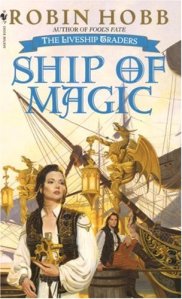 Definitely flying through Story by the seat of my pants, with only a glance or two at the instruments and charts from time to time. I get to land in some very interesting places that way, and sometimes I’m in completely uncharted territory, and wondering just as much as the reader might about exactly where I am bound.
Definitely flying through Story by the seat of my pants, with only a glance or two at the instruments and charts from time to time. I get to land in some very interesting places that way, and sometimes I’m in completely uncharted territory, and wondering just as much as the reader might about exactly where I am bound. Q: I was prompted to start this series of interviews because there seems to be a perception in the US and the UK that fantasy is a bit of a boy’s club. Do you think there’s a difference in the way males and females write fantasy?
Q: I was prompted to start this series of interviews because there seems to be a perception in the US and the UK that fantasy is a bit of a boy’s club. Do you think there’s a difference in the way males and females write fantasy? Oh, I think I accidentally already answered that!
Oh, I think I accidentally already answered that!
